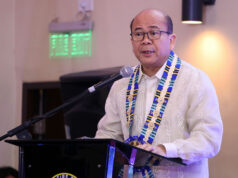Senators support ducking next PISA study pending reforms
A SENATE committee on Thursday recommended backing out of the next round of the Programme for International Student Assessment (PISA), where the Philippines underperformed, pending reforms to the educational system.
while the Department of Education (DepEd) puts in place education reforms to improve student performance.
Senator Sherwin T. Gatchalian, who chairs the Senate Committee on Basic Education, Arts and Culture, supported backing out of the 2021 PISA as the Education department has only begun to implement reforms, such as the enhanced curriculum and upgraded teacher training.
“Nag-umpisa palang ’yung mga repormang dapat gawin... (this) will take time (It will take time to feel the impact of the reforms, which have just started),” Mr. Gatchalian said in a briefing Thursday. He pointed out that the initial implementation of the enhanced curriculum will take place in June.
“So, hindi sapat ’yung oras dahil ang next PISA is March of next year… Ang recommendation ko ’wag muna kumuha ng PISA (There is not enough time because the next PISA will take place in March next year. I recommend that we withdraw).”
Mr. Gatchalian said participating in the PISA costs the Philippines around $1 million. He said this amount could be used instead to improve research, among other reforms.
“Hindi mura ang PISA kaya kung di tayo gagawa ng reporma, ang resulta pareho lang (It’s not cheap to participate in PISA, and if we don’t reform we will remain stagnant),” he said.
The 2018 PISA, conducted by the Organization for Economic Cooperation and Development (OECD), showed the Philippines ranking the lowest out of 79 countries.
The OECD assessed that Filipino students are particularly strong in memorization, but not in the application of concepts.
“Students in the Philippines are actually quite good with producing subject matter content and they have to memorize material and repeat it, actually students work quite well at the basic level, it’s actually one of the strength of our students,” OECD Director for Education Andreas Schleicher said during the hearing. Mr. Schleicher, who was in France, spoke before the panel in a video call.
“But when students were asked to creatively apply the knowledge… sometimes (they) did not do well and this is a very large part of the PISA tasks that require the students… to use and apply knowledge.”
He observed that Filipino students hold attitudes that success is genetically-based. — Charmaine A. Tadalan



